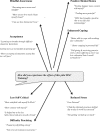Caring for the caregivers: Evaluation of the effect of an eight-week pilot mindful self-compassion (MSC) training program on nurses' compassion fatigue and resilience
- PMID: 30462717
- PMCID: PMC6248952
- DOI: 10.1371/journal.pone.0207261
Caring for the caregivers: Evaluation of the effect of an eight-week pilot mindful self-compassion (MSC) training program on nurses' compassion fatigue and resilience
Abstract
Background: Nurses vicariously exposed to the suffering of those in their care are at risk of compassion fatigue. Emerging research suggests that self-compassion interventions may provide protective factors and enhance resilience. This pilot study examined the effect of an eight-week Mindful Self-Compassion (MSC) training intervention on nurses' compassion fatigue and resilience and participants' lived experience of the effect of the training.
Methods: This observational mixed research pilot study adopted an evaluation design framework. It comprised of a single group and evaluated the effects of a pilot MSC intervention by analyzing the pre- and post-change scores in self-compassion, mindfulness, secondary trauma, burnout, compassion satisfaction, and resilience. The sample of the nurses' (N = 13) written responses to the question, "How did you experience the effect of this pilot MSC training?" were also analyzed.
Results: The Pre- to Post- scores of secondary trauma and burnout declined significantly and were negatively associated with self-compassion (r = -.62, p = .02) (r = -.55, p = .05) and mindfulness (r = -.54, p = .05). (r = -.60, p = .03), respectively. Resilience and compassion satisfaction scores increased. All variables demonstrated a large effect size: Mean (M) Cohen's d = 1.23. The qualitative emergent themes corroborated the quantitative findings and expanded the understanding about how MSC on the job practices enhanced nurses' coping.
Conclusion: This is the first study to examine the effect of a pilot (MSC) training program on nurses' compassion fatigue and resilience in this new area of research. It provides some preliminary empirical evidence in support of the theorized benefits of self-compassion training for nurses. However, further research, such as a Randomized Control Trial (RCT) with a larger sample size and a longitudinal study, is required to see if the benefits of self-compassion training are sustainable.
Conflict of interest statement
The author has declared that no competing interests exist.
Figures
References
-
- Figley CR. Compassion fatigue as secondary traumatic stress disorder: An Overview In: Figley, editor. Compassion fatigue: Coping with secondary traumatic stress disorder in those who treat the traumatized. Brunner-Routledge; New York: 1995.
-
- Fortney L, Lucherland T, Zakletskaia L, Zgireska A, Rakel D. Abbreviated mindfulness intervention for job satisfaction, quality of life, and compassion in primary care clinicians: A pilot study. Ann Fam Med. 2013; 11(5) 412–420. 10.1370/afm.1511 - DOI - PMC - PubMed
-
- Rabb K. Mindfulness, self-compassion and empathy, among health care professionals: A review of the literature. J Health Care Chaplain. 2014; 20: 95–108. 10.1080/08854726.2014.913876 - DOI - PubMed
-
- Olson MA, Kemper KJ, Mahan JD. What factors promote resilience and protect against burnout in first year pediatric and medicine-pediatric residents. J Evid Based Complementary Altern Med. 2015; 1–7. Sage Publications. - PubMed
-
- Stamm BH. Professional Quality of Life: Compassion Satisfaction and Fatigue Version 5 (ProQOL); (2012). Available from: www.proqol.org September 2014.
Publication types
MeSH terms
LinkOut - more resources
Full Text Sources
Medical


